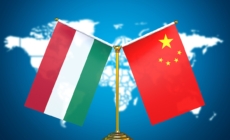-
Gen Z Celebrates Donald Trump’s Victory Across College Campuses - 8 mins ago
-
Highly touted freshman Ace Bailey to miss No. 25 Rutgers’ opener with undisclosed injury - 10 mins ago
-
Prop. 35, which taxes managed care organizations, passed by California voters - 19 mins ago
-
Snow finally settles on Mount Fuji, weeks after it usually appears - 21 mins ago
-
Chinese Battery Factory CATL to Start Production in Debrecen Next Year - 27 mins ago
-
Speaker: Hungary-China bilateral relations have developed ‘spectacularly’ in recent years - 33 mins ago
-
Travis Kelce Opens up on Final Eras Wish - 47 mins ago
-
Tom Brady: Chiefs ‘have a great offensive identity’ despite what numbers say - 53 mins ago
-
California voters pass Prop. 2, state bond measure to upgrade schools - 59 mins ago
-
Economic Neutrality and Investments to Offset Dependence on German Economy - about 1 hour ago
Japan’s Ban on Same-Sex Marriage Ruled Unconstitutional
Japan’s Tokyo High Court ruled Wednesday that the nation’s ban on same-sex marriage is unconstitutional.
The decision, which echoes a similar ruling by the Sapporo High Court in March, marks a significant step in the campaign for marriage equality in Japan, the only Group of Seven (G7) country that has yet to legally recognize same-sex unions.
Described by the court as a “a groundless legal discrimination based on sexual orientation,” the ruling states the law violates the constitutional guarantee of right to equality, as well as individuals’ dignity and equality between sexes.
In its ruling, the court argued that the ban constitutes “discriminatory treatment” based on sexual orientation, with no legal grounds for denying LGBTQ+ couples the right to marry.
The court highlighted that marriage laws in Japan fail to respect “individual dignity” and the principle of equality, enshrined in Articles 14 and 24 of the Japanese Constitution.
Damages have been sought by the plaintiffs for the violation of their rights. At present, they have been denied financial compensation—a common outcome in similar rulings.
AP Photo/Eugene Hoshiko, File
‘A Critical Step Toward Marriage Equality in Japan’
The decision drew cheers outside the courthouse from supporters and allies.
They waved banners at the scene calling for marriage equality and further action saying: “Further advance toward marriage equality!” and “No more waiting for legal revision!”
“This decision marks a critical step toward marriage equality in Japan and offers renewed hope to same-sex couples across the country,” said Boram Jang, an East Asia researcher with Amnesty International, who has followed the legal battles closely.
“This case is also a reminder of the lengthy and fragmented legal battles couples must endure to exercise rights to equality that should already be protected. It is an injustice that weighs heavily on their lives.”
He says the Japanese government must take action to legalize same-sex marriage across the country, rather than relying on inconsistent and inadequate responses at the local government level.

MARTIN BUREAU/AFP via Getty Images
Polls Show Rising LGBTQ+ Rights Support
Public opinion in Japan has steadily shifted in favor of same-sex marriage.
According to a 2023 poll by JNN, approximately 63 percent of Japanese citizens support marriage equality, with even higher support among younger generations of up to 80 percent.
Last year, the Japanese Diet, the national legislature of Japan, passed a landmark law aimed at increasing awareness and preventing discrimination based on sexual orientation and gender identity.
The law seeks to “promote understanding” among the public while discouraging “unfair” treatment of LGBTQ+ individuals.
Despite this, legislative progress has stalled, largely due to the ruling Liberal Democratic Party’s (LDP) traditionalist stance. Chief Cabinet Secretary Yoshimasa Hayashi said following the ruling that the government would monitor additional cases, because “an introduction of same-sex marriage closely affects family values of the people.”

Stefan Rousseau-WPA Pool/Getty Images
International Pressures From G7
In recent years some municipalities have issued a “partnership system,” where certificates allow same-sex couples limited rights, including the ability to secure joint leases or access certain health care benefits.
However, these certificates do not confer full legal status or essential rights including inheritance, spousal visas, or parental recognition.
The lack of legal protections for LGBTQ+ individuals has faced growing international scrutiny, particularly ahead of Japan’s hosting of the G7 summit earlier this year.
Both Amnesty International and Human Rights Watch have urged Japan to align its policies with international human rights standards.
“All couples, no matter their gender or sexual orientation, deserve the same legal rights, protections, and the dignity that comes with recognition under the law,” Jang said.
This article includes reporting from The Associated Press
Source link































